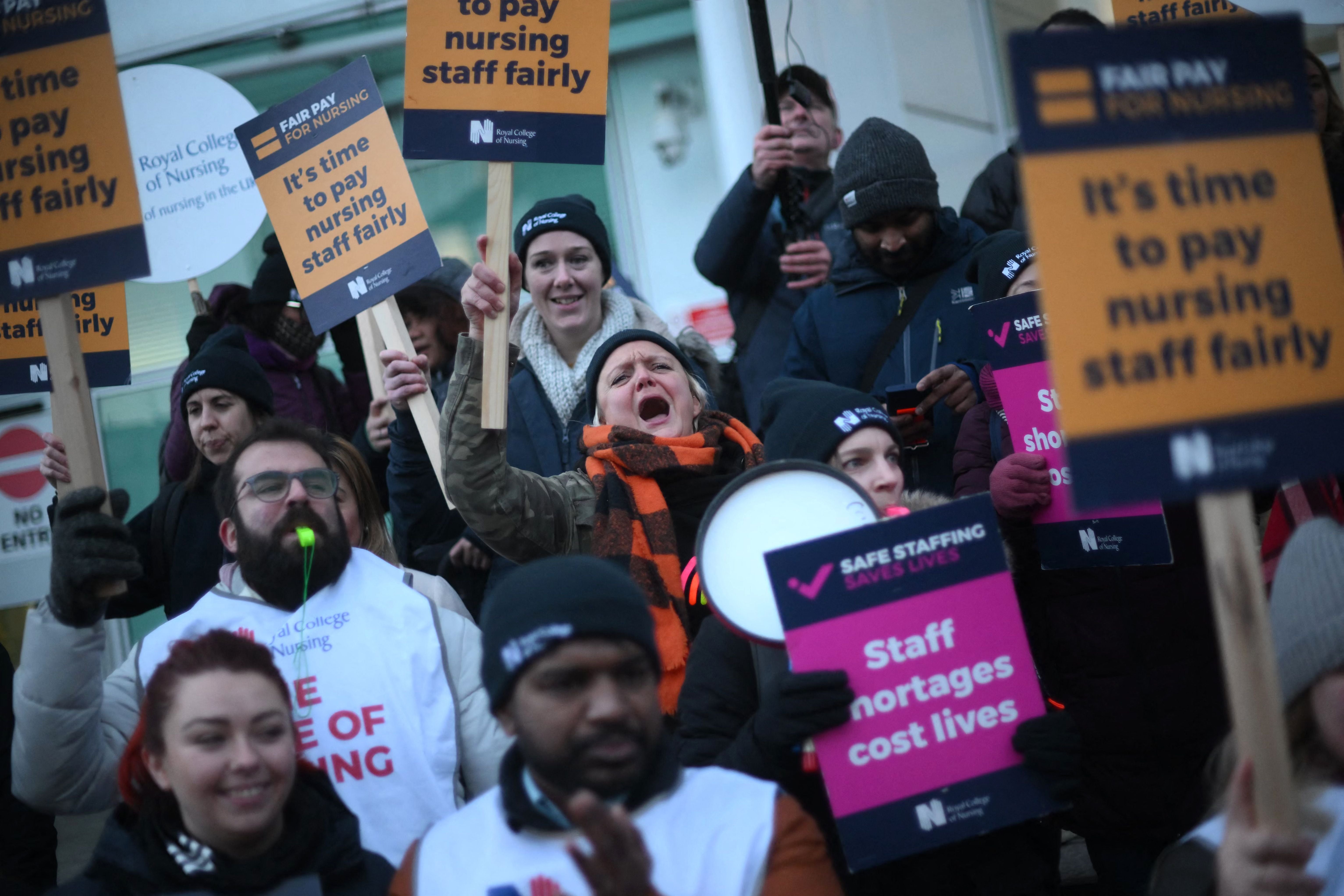It is a bitter disappointment that pay negotiations with nurses have failed
Editorial: As has been true since the strikes began last autumn, the only route back to normality for the NHS is via negotiations

In his latest propaganda video, titled “Getting results for the British people”, Rishi Sunak lists some of the recent achievements of his premiership. He is right to take some pride in them.
The Anglo-French summit with Emmanuel Macron, for example, and the Windsor Framework for post-Brexit trade with Northern Ireland, are both decisive breakthroughs in repairing the UK’s fractured relationships with France and with the wider European Union.
However, the prime minister was somewhat premature in claiming that he’d settled the NHS pay disputes involving a million health service workers.
The results of the two ballots brought mixed news. Members of the Royal College of Nursing voted by a narrow margin to reject the two-year deal, while their counterparts at Unison decided to accept, with overwhelming support. It is a frustrating moment.
A month or so ago, and after weeks of stressful industrial action, the deal did look as though it would have the support of the RCN’s membership as well as its leadership, and that Unison would follow their lead. However, disappointingly, that has not transpired.
The nurses said no. Depending on how the government reacts to the junior doctors’ proposal to involve the arbitration service Acas in their separate dispute, the NHS is facing weeks, if not months, more disruption.
It is indeed a bitter disappointment. Perhaps some of the nurses observed the militancy of the doctors and decided to double down on their demands. They would be conscious that a strike involving both doctors and nursing staff, potentially simultaneously, would have an unprecedented impact on the NHS.
In human terms, it would have a devastating effect on the physical and mental health of patients. It is impossible to see how a minimum level of care could be realistically maintained in such a scenario. For this very reason, the nurses and doctors might well refrain from such drastic action, but it is by no means clear at the moment.
So yet more operations and treatments will be postponed; the post-pandemic backlog will pile up some more; and the public will find their sympathies torn.
Especially after Covid and the “clap for carers” initiative, the nation knows it owes a debt of honour to the NHS and its staff who, far from staying at home and self-isolating, put themselves in the way of harm from a potentially deadly disease – and many paid the ultimate price for doing their duty.
Against that, a set of deeply unpopular Conservative ministers don’t really stand much of a chance in the court of public opinion.
With the best will in the world, Steve Barclay, the health secretary, is never going to get anyone to clap for him, with the possible exception of a Conservative Party conference. Even in areas of policy where setbacks and disasters have nothing to do with No 10, the tendency of the public is to blame the government regardless.
So, to some extent at least, it will be with the collapse of the pay settlement. Despite finding the money and taking something of a risk with the trends in wage inflation, the government got little credit for ending the dispute – but will receive some obloquy for its failure.
The nurses and the doctors have made a strong case throughout that the NHS, like any organisation, needs to pay the market rate to recruit and retain the right calibre of people. The government’s wider concerns about economic policy haven’t resonated so easily.
Yet for all that, the nurses, and the doctors for that matter, cannot assume that public sympathy for their cause is unconditional or unlimited. The narrowness of the vote to reject the pay offer suggests that support for taking industrial action may not be as solid as it was, and that even a marginal improvement in the government’s offer could be enough to tip the balance and end the misery.
Public opinion is crucial. It would only take, say, a few examples of lives being lost, as a direct and demonstrable result of the strike action, to shift the terms of the argument, perhaps decisively. In theory, such incidents should not arise, given the statutory duties of medical staff and the local agreements they have with NHS trust management.
However, as they say, accidents happen, and in healthcare there is no great precision in determining exactly what represents adequate cover on any given day. The decision by junior doctors to hold three- and four-day strikes was an especially hard line to take early in their dispute, with the longer periods carrying commensurately higher and cumulative risks to patient safety than, say, a single day of action.
As has been true since the strikes began last autumn, the only route back to normality for the NHS is via negotiations. These have proved tortuous and, as is now apparent, ultimately unreliable. But the nurses are already – almost – ready to settle.
As an alternative to yet more strikes, the nurses should join the doctors and suggest to the government that their grievances be discussed with the help of Acas.
To a Conservative government, such a route out of these difficulties may feel like a betrayal of the independent pay review body system, and a throwback to a corporatist past, but at the moment it would seem to be the least bad option to take in order to end these disputes as soon as possible.






Join our commenting forum
Join thought-provoking conversations, follow other Independent readers and see their replies
Comments